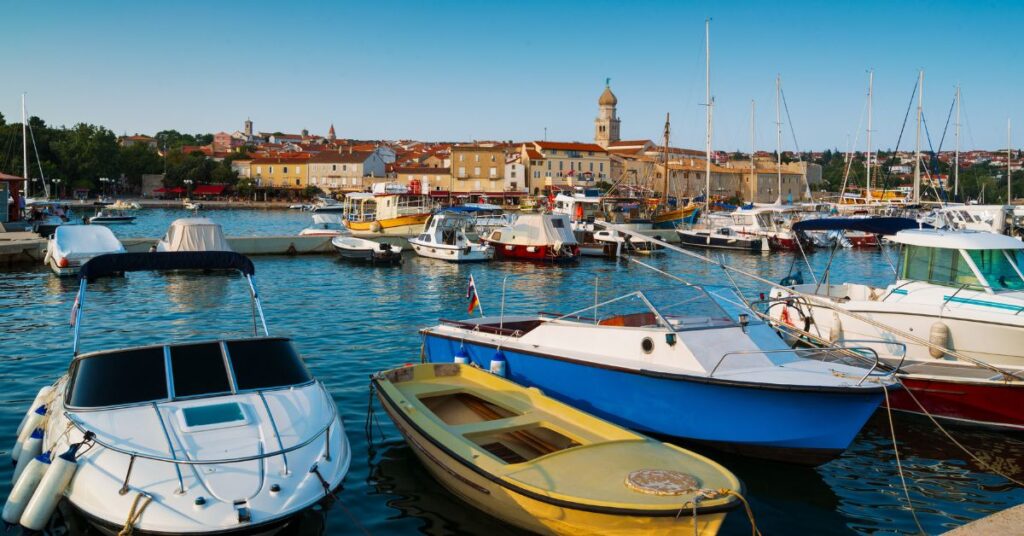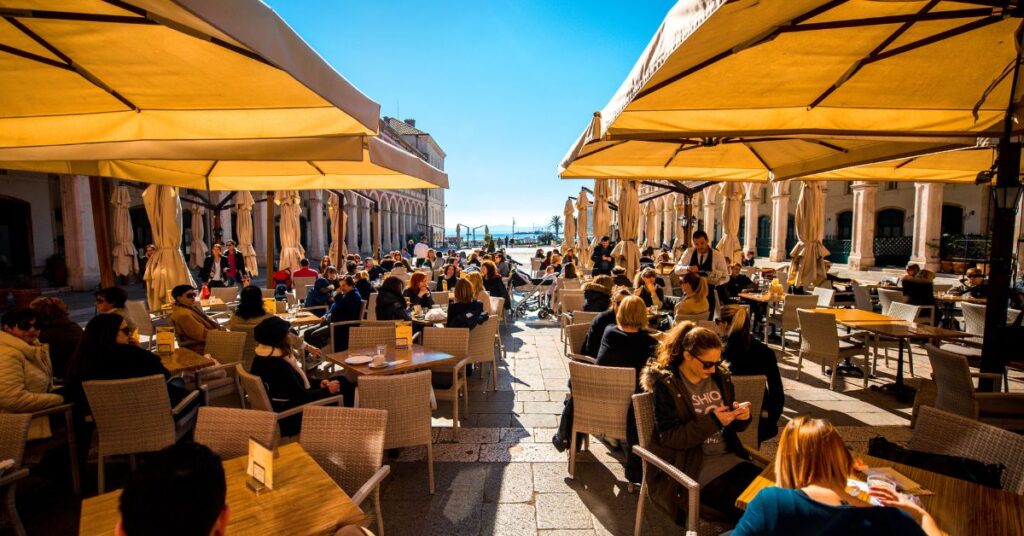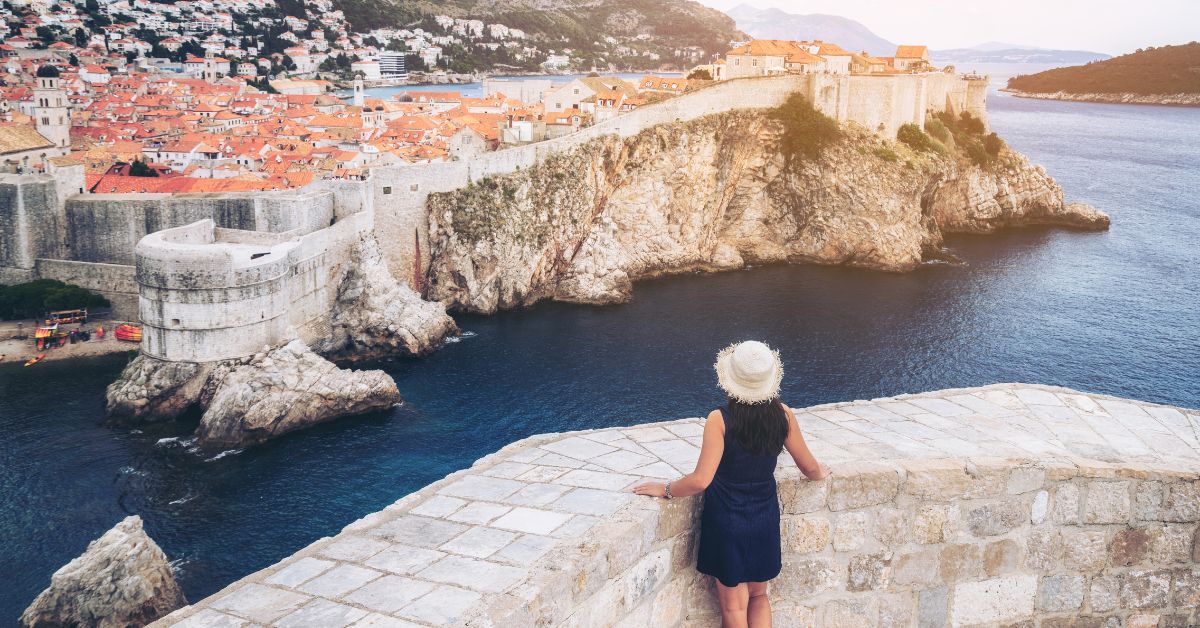Croatia has risen in popularity among European countries in recent years, thanks in part to Dubrovnik’s prominent role as King’s Landing in HBO’s Game of Thrones. But there’s much more to this country than its silver screen ties, like its medieval architecture, crystal-clear waters, and 1,000+ islands.
With the launch of their digital nomad visa, living there is more accessible than ever for Americans — and as a bonus, it even exempts holders from Croatian income taxes. Learn more about it in our guide below!
Snapshot of expat life in Croatia
| Population | Capital City | Currency | Official Language | School-year calendar | Best time to move abroad |
|---|---|---|---|---|---|
| 3.9 million | Zagreb | Euro | Croatian | September to June | Late spring or early fall |
Digital nomad visa in Croatia: background
Split-based entrepreneur and investor Jan de Jong first suggested a Croatian digital nomad visa during an April 2020 virtual conference on tourism in the country, later detailing his proposal in an open letter to Prime Minister Andrej Plenković on LinkedIn1. Before long, the government was seriously discussing the idea. In December 2020, the digital nomad visa was officially approved; by January 2021, it opened for applications.
How to become a digital nomad in Croatia

Application eligibility
To be eligible for Croatia’s digital nomad visa, Americans need to meet two primary criteria:
- Work with/for a company outside of Croatia
- Earn a monthly income of around €2,500/month
- Plus an additional €90 per month for each family member you bring along
Visa requirements & duration
To apply for Croatia’s digital nomad visa, you’ll need:
- A completed application form
- A valid passport
- Standard passport-sized photos
- Proof of sufficient funds (e.g. bank statements, pay stubs) demonstrating that you earn the minimum monthly income, or have the equivalent in savings, to support yourself during your stay
- Proof of health insurance
- Proof of purpose, e.g. work contract, letter of employment, business license for a company registered outside of Croatia
- A clean criminal background check from the FBI2
- Proof of accommodations for your stay in Croatia, e.g. Airbnb/hostel reservation or Croatian rental contract
The visa lasts for a total of one year. While it can’t be renewed, you can apply for a separate digital nomad visa six months after you leave Croatia upon the expiration of the first.3
Health insurance for digital nomads in Croatia
To have your application approved, you must purchase private health insurance that lasts for the entire duration of your visa. You can turn to private health insurance providers in Croatia or companies that offer digital nomad health insurance, like SafetyWing.
Application Process
To apply for Croatia’s digital nomad visa, you must:
- Gather all of the required documents
- Submit the Obrazac 1a application form. There are a few options to do this:
- Complete the application online
- Mail it or submit it in person to your nearest Croatian embassy/consulate
- Submit it in person in Croatia at your nearest police station
- Pay the associated fees
After receiving your approval (typically within about 30 days of submission), you must:4
- Register your address in Croatia at your local police station within three days of arrival
- Bring:
- Application form Obrazac 16a
- Proof of accommodation
- Bring:
- Return to your local police station to get fingerprinted and receive a temporary residence permit
- Bring:
- Passport photos
- Proof of paid administrative fee for the biometric residence permit
- Bring:
- Pick up your permanent biometric residence card
Best places to live in Croatia

Dubrovnik
Dubrovnik is a gorgeous walled city best known for its medieval architecture, beaches, and — as previously mentioned — being the real-life King’s Landing from Game of Thrones.
How much does it cost to live in Dubrovnik?
According to Numbeo,5 the average monthly expenses (excluding rent) for a single person in Dubrovnik are about €886.8 (~$961.29 USD).
Rent in the city center, meanwhile, comes out to an average of:
- 1 BR: €643 (~$697 USD)
- 3 BR: €1,200 (~$1300 USD)
Zagreb
Zagreb is the capital of Croatia and a hotspot for all things cultural — museums, street markets, restaurants, etc. — as well as ample parks and green spaces.
How much does it cost to live in Zagreb?
According to Numbeo,6 the average monthly expenses (excluding rent) for a single person in Zagreb are about €773.9 (~$838.91 USD).
Rent in the city center, meanwhile, comes out to an average of:
- 1 BR: €668.75 (~$724.92 USD)
- 3 BR: €1,123.08 (~$1217.42 USD)
Split
Split, the second-largest city in Croatia, mixes old-world charm with a modern vibe. It is known for its beaches, ancient ruins, and sunny weather.
How much does it cost to live in Split?
According to Numbeo,7 the average monthly expenses (excluding rent) for a single person in Split are about €700.7 (~$759.56 USD).
Rent in the city center, meanwhile, comes out to an average of:
- 1 BR: €650.63 (~$705.28 USD)
- 3 BR: €1,157.27 (~$1254.48 USD)
Digital nomad life in Croatia

5 things that should be on your Croatia bucket list
There’s no shortage of exciting things to do while living in Croatia — but these five activities are must-dos for your 12 months there:
- Walk the walls of Old Town Dubrovnik: The tall stone walls that guarded medieval Dubrovnik may have been designed to keep invaders out, but today, tourists are welcome in
- Marvel at Diocletian’s Palace: The 4th-century home of Roman Emperor Diocletian, located in Split, is remarkably well-preserved
- Explore Plitvice Lakes National Park: With 4 hiking trails, 16 main lakes, and 90 waterfalls, you can spend hours in this natural wonder
- Go café hopping in Zagreb: On late Sunday mornings and early afternoons, locals love to meet up and catch up over coffee in the main square
- Check out Pula’s amphitheater: Built all the way back in the 1st century, Pula’s Roman arena is the fourth-largest in the world
Expat community in Croatia – how to find your people

It’s normal to feel unsure and even a little lonely when you move to a new country. Fortunately, Croatia is bursting with opportunities to get out and meet new people -you’ll be making new friends in no time. A few ideas to get you started:
- Move into a co-living space
- Work from a coworking space
- Stay in a social hostel (these often advertise social events, too!)
- Take classes (e.g. sailing, cooking, etc.)
- Attend events on Meetup & Couchsurfing
- Join local expat groups on Facebook to learn about opportunities to go out for drinks, hiking, etc.
- Attend a language exchange
Moving to Croatia
Before making the leap to becoming a digital nomad in Croatia, make sure you cross the following off of your to-do list:
- Gather all of your important documents (passport, visa, etc.)
- Set up a doctor’s appointment to get any vaccines or medications you might need
- Buy tickets for your flights both into and out of the country
- Book accommodations for your arrival
- Research what to bring, create a list, and pack your bags
- Flag your travel plans to your bank so they don’t mark purchases abroad as suspicious
- Set up a forwarding address for your mail, if necessary
- Connect with other digital nomads in Croatia for advice on sites like Reddit or Facebook
Do digital nomads pay tax in Croatia?
No, if you move to Croatia on a digital nomad visa, you are not taxed on your income by the Croatian government. (Hooray!) However, if you plan to find a way to stay in Croatia in the long term, you will likely want to familiarize yourself with Croatian taxes.
VAT in Croatia
The standard Value Added Tax (VAT) rate in Croatia is 25%. There is also a reduced VAT rate of 13% for accommodation, food, and newspapers.
Do American digital nomads in Croatia have to pay US taxes?
Yes. America’s tax system requires all citizens and permanent residents to file a federal tax return (provided that they meet the minimum income reporting threshold) regardless of where in the world they live.
Expat tax provisions for Americans filing US taxes in Croatia
Moving abroad can feel overwhelming to navigate, especially when navigating taxes gets thrown into the mix. Below are some of the additional reporting obligations tax breaks expats should read up on.
Foreign Earned Income Exclusion (FEIE)
The FEIE allows you to exclude a certain amount of foreign-earned income from taxation ($120,000 for 2023 tax year, $126,500 for 2024). To be eligible, you must pass either the physical presence test or the bona fide residence test. If you qualify, you’re also eligible for the Foreign Housing Exclusion/Deduction, which allows you to write off qualifying housing expenses like rent and utilities.
Foreign Tax Credit (FTC)
The FTC allows you to subtract what you pay in income taxes to a foreign government from what you owe the US government in income taxes. With Croatia’s digital nomad visa, however, you won’t be paying income taxes — so you wouldn’t be able to leverage this unless you eventually secure a Croatian visa that classifies you as a tax resident.
Foreign Bank Account Report (FBAR)
If you have $10,000 or more in foreign bank accounts at any point in the year, you’ll need to report the contents of those accounts to the Financial Crimes Enforcement Network (FinCEN) via FinCEN Report 114.
Child Tax Credit (CTC)
If you have qualifying dependents living with you in Croatia, you can file the Child Tax Credit just as you would in the US to get as much as $2,000 in partially refundable credits.
Foreign Account Tax Compliance Act (FATCA)
If you have over $200,000 in foreign assets by the last day of the tax year or over $300,000 in foreign assets at any point during the tax year, FATCA requires you to file Form 8938.
References
- Croatia opens its doors to digital nomads with a special visa
- Identity History Summary Checks (Rap Sheets)
- Croatia Digital Nomad Visa
- How to apply for the digital nomad residence permit in Croatia: Guide for 2023
- Cost of Living in Dubrovnik
- Cost of Living in Zagreb
- Cost of Living in Split
- Croatia’s Digital Nomad Visa Draws in Thousands of Foreigners, but Long-Term Stays May Pose Challenges
Digital Nomad in Croatia - FAQ
-
When is the best time to get a Croatia Digital Nomad Visa?
The initial validity of the Croatia digital nomad visa will let you enjoy the country’s climate year-round. However, if you plan to depart Croatia prior to the expiration of your visa, plan to arrive in time for the warmer spring and summer months, which typically run from May to October.
-
How many digital nomads currently live in Croatia?
There are as many as 10,000 digital nomads currently in Croatia (8). Given the novelty of the country’s digital nomad visa, we expect this figure to continue to rise in the coming years. For the moment though, Croatia makes for an excellent off-the-beaten-track destination for prospective digital nomads.

 Connect on LinkedIn
Connect on LinkedIn










